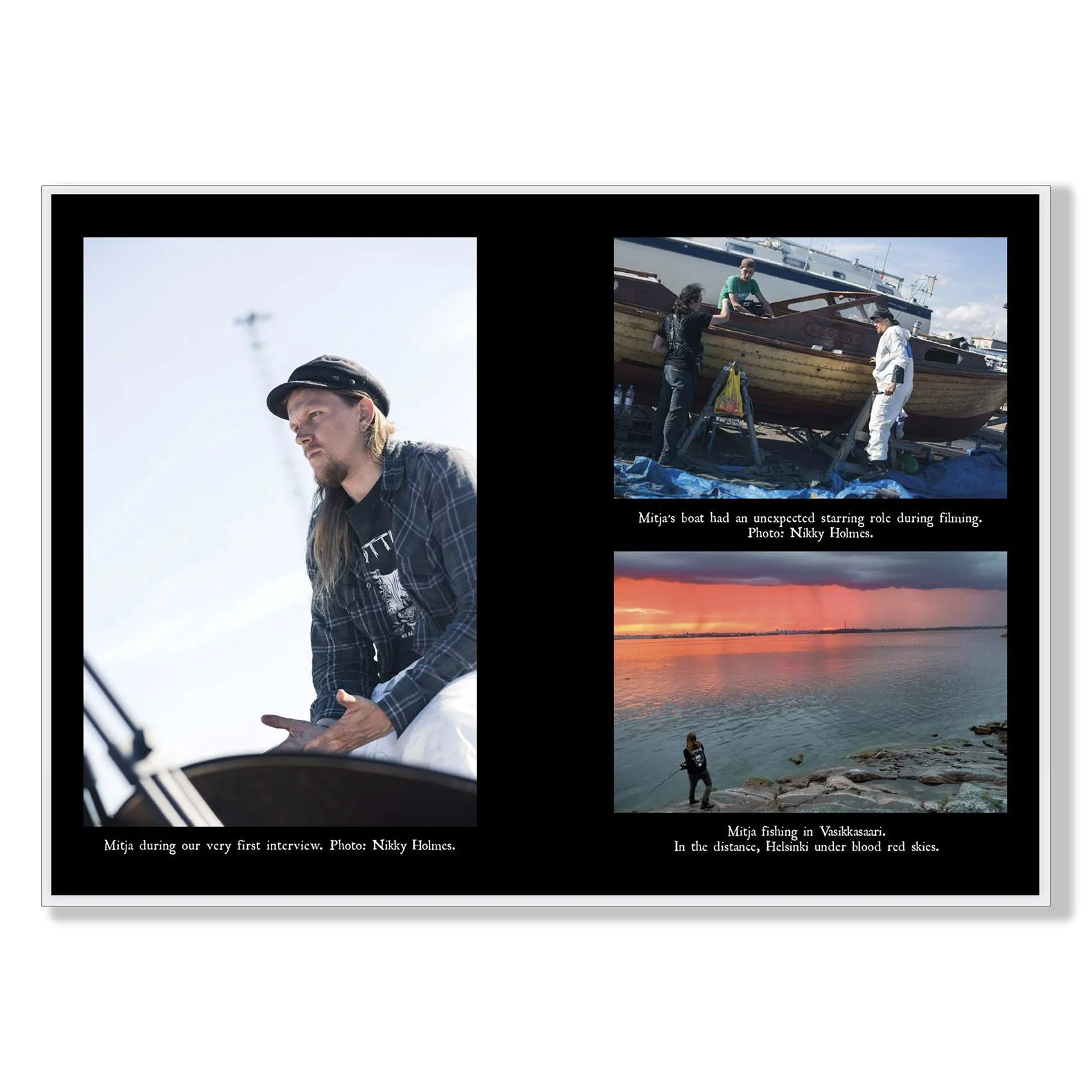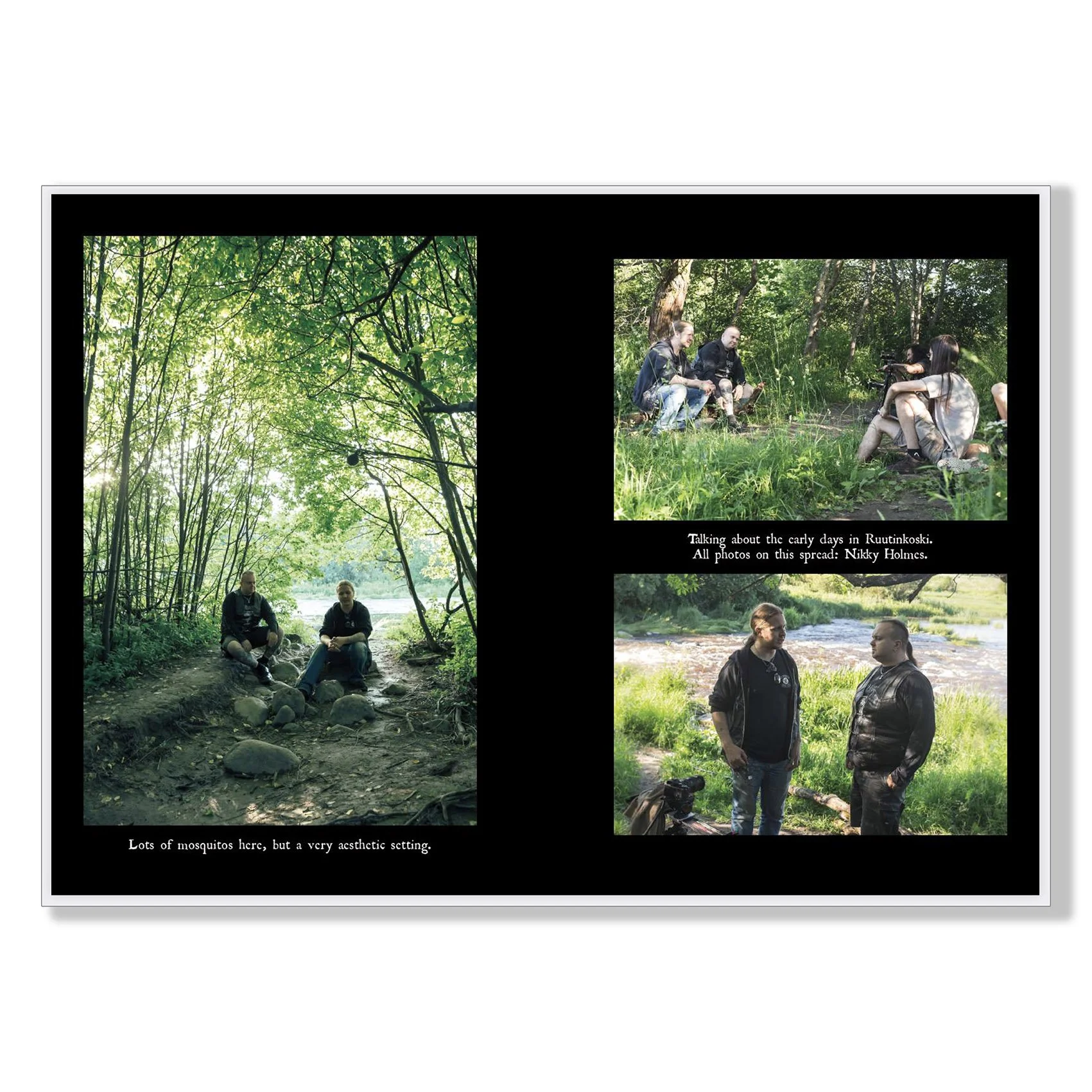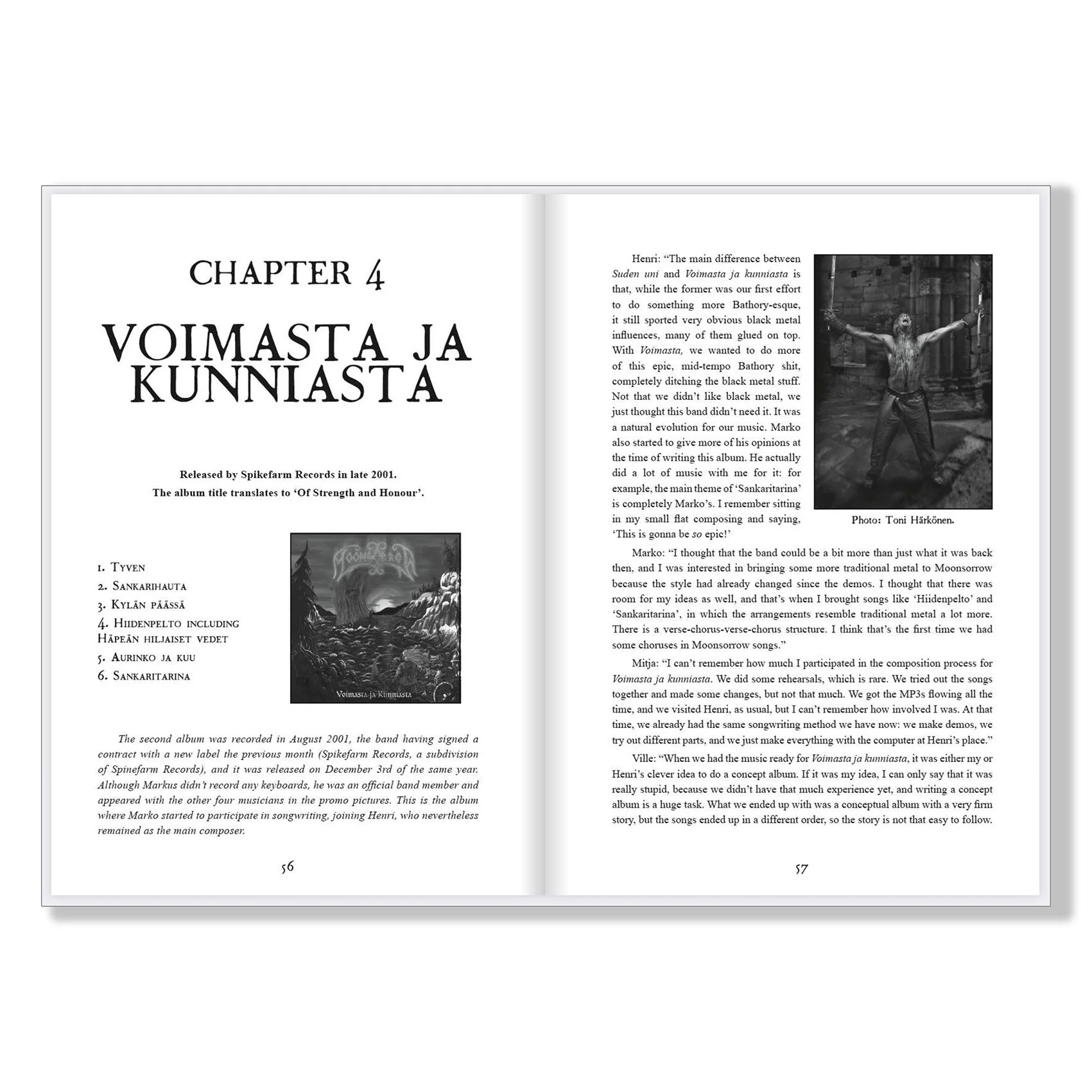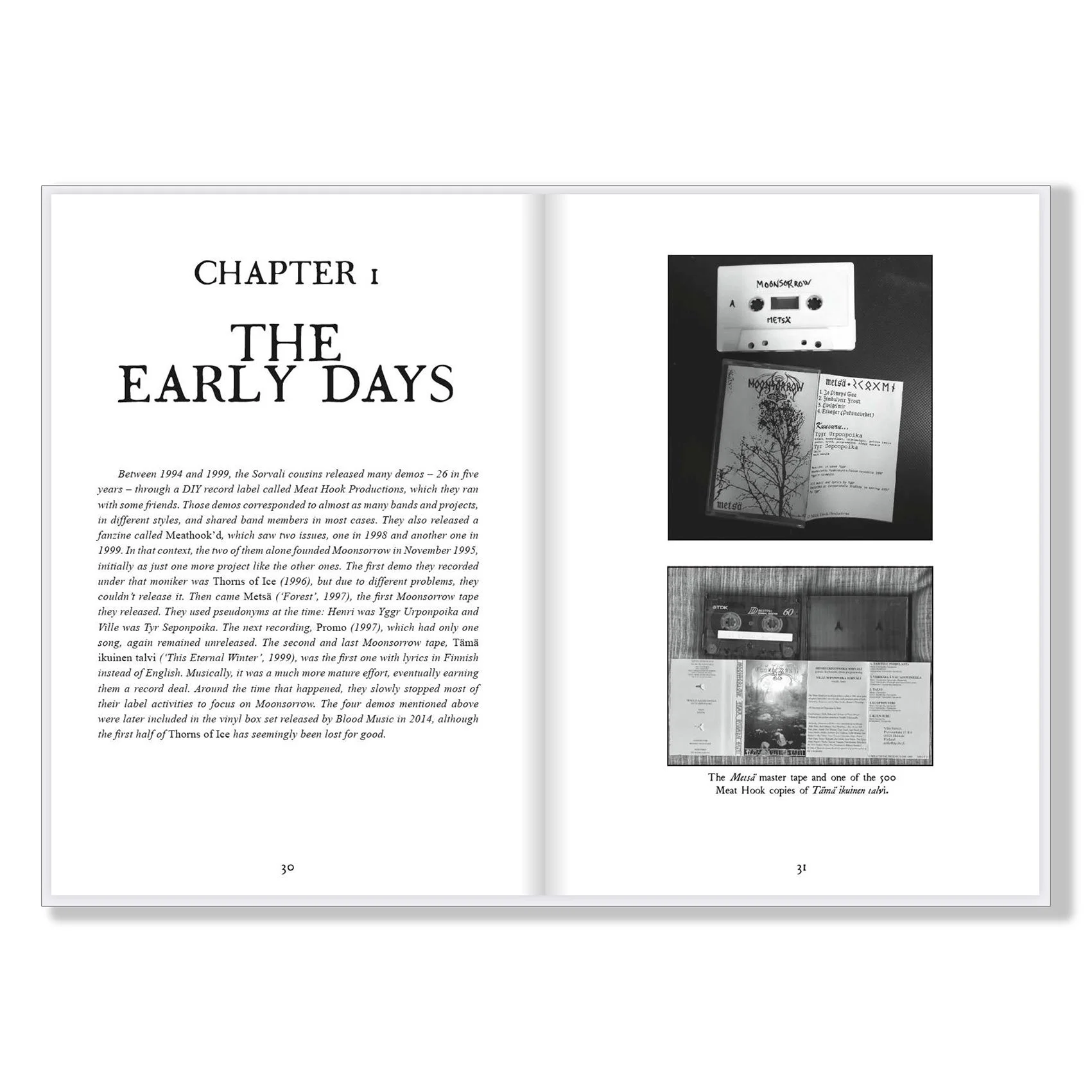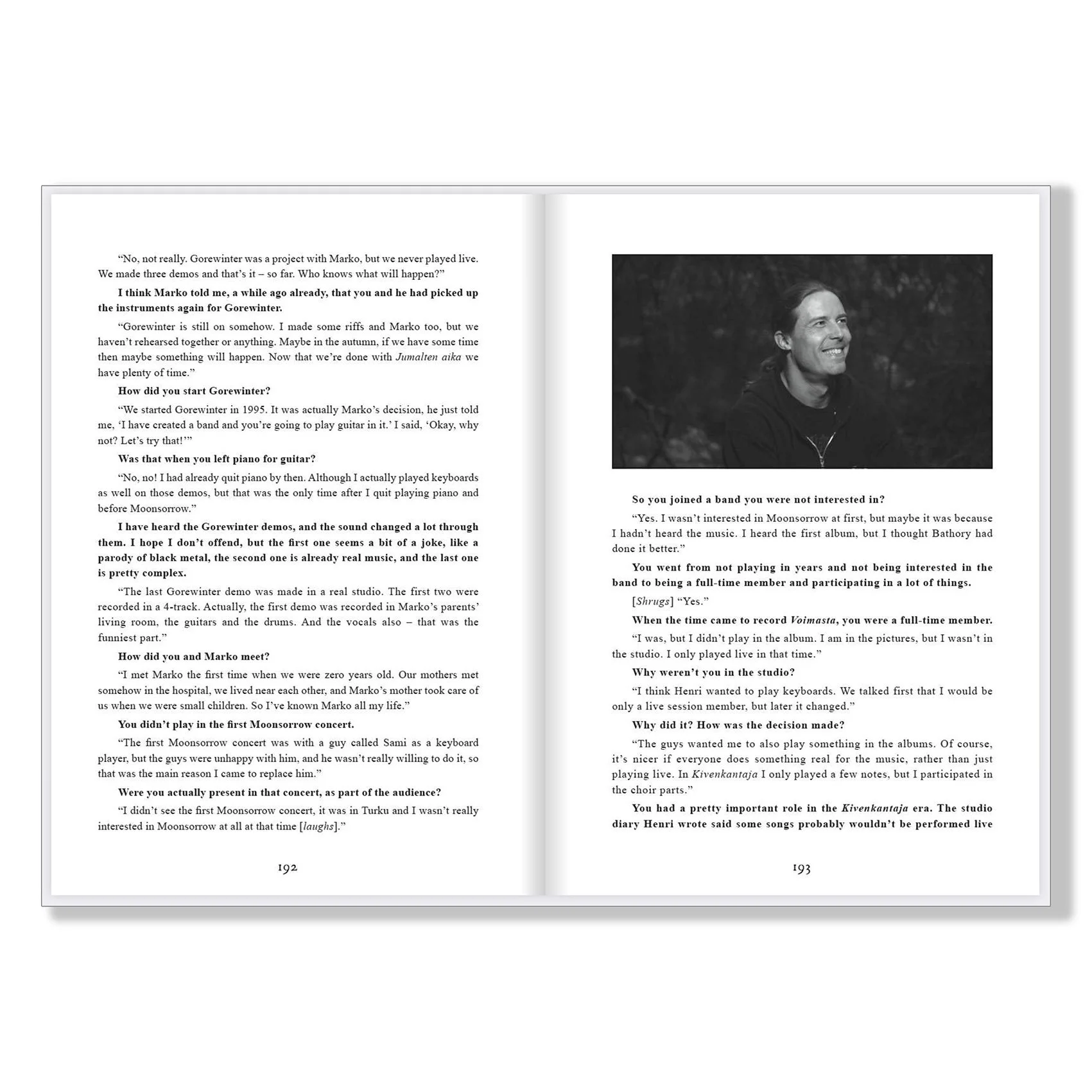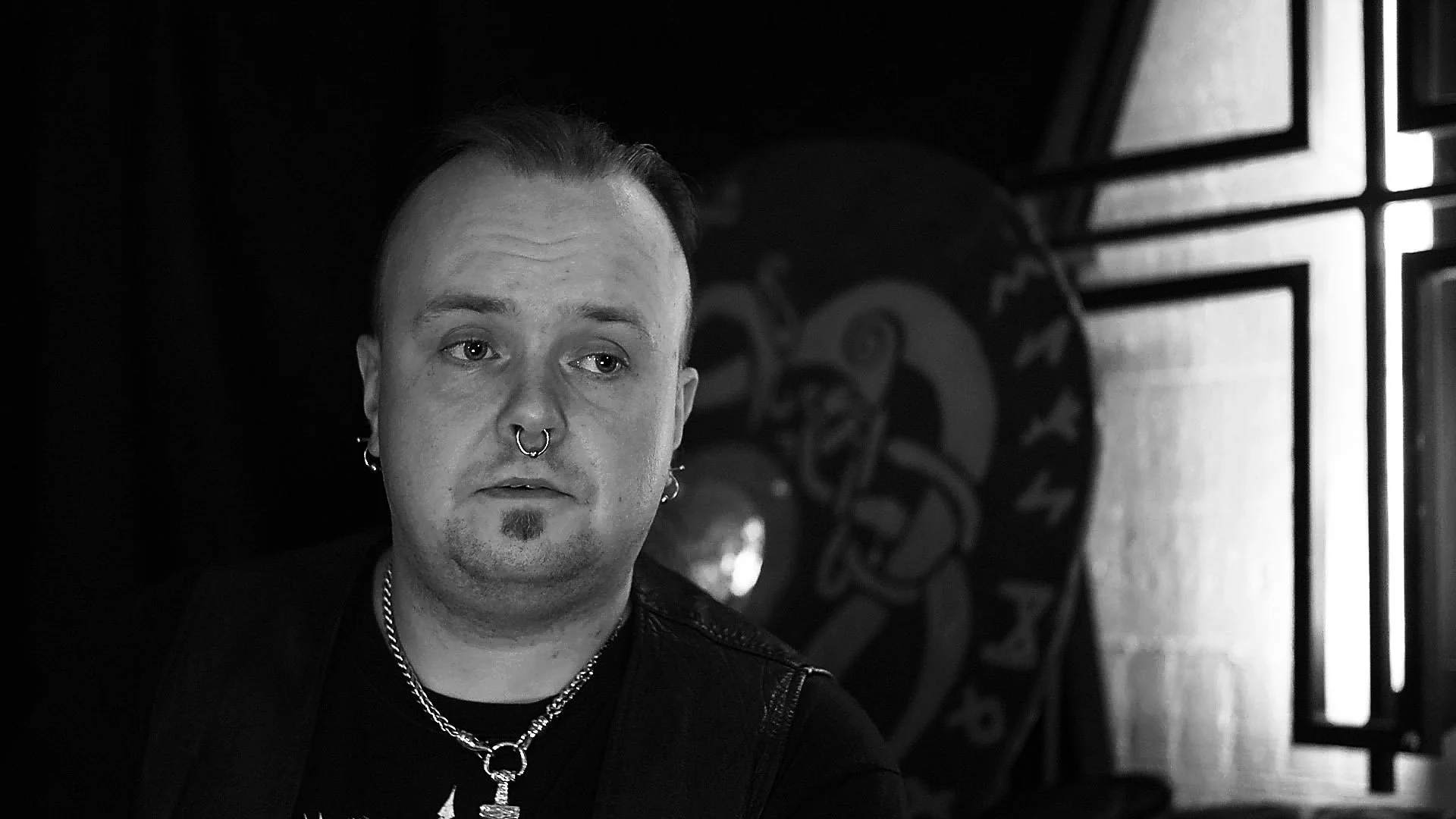
“it’s completely okay that people do whatever they wish…
but I don’t want to be associated with those people.”
MOONSORROW
EXCERPT FROM THE NEW BOOK
HOME OF THE WAVES:
CONVERSATIONS WITH MOONSORROW
———————————————————
This interview excerpt is part of a larger chapter included in the new book Home of the Waves: Conversations with Moonsorrow (available from Cult Never Dies main store HERE and Cult Never Dies EU store HERE)
HENRI IN THE HORROR SHOP
For his second interview session, Henri chose the shop of a friend of his. It was a last-minute idea: he only called the owner about two hours before the starting time, but he accepted and welcomed us with a big smile. Located in the area of Konala (although it has moved somewhere else since), it’s called Horror Shop, and it does exactly what it says on the tin. Not only can you find the usual coffins, maggots and all that jazz, but also items related to real horrific stuff, such as historical serial killers. Not everything is horror, however: there are also some Viking-related objects and books, medieval shields and swords, and a very respectable amount of extreme metal CDs. The music area had a touch of humour: the ‘Rap & Hip Hop’ section had only an empty CD case with the words “Never in this shop!” written on it. The owner of the shop is also a film director, and he made, among others, the movies The Curse of the Witches’ Blood and The Black-Blooded Brides of Satan, for which Henri wrote the music. Stepping inside the shop feels like walking into a different world: in contrast with its surroundings – a hideous industrial area full of warehouses, soulless shopping centres and gas stations – the shop is carefully decorated to create a very specific atmosphere, and it definitely succeeds.
Please tell us about your musical influences in a wide sense.
“In the beginning, my main influences were the more symphonic and technical bands within black metal. Even though I loved the music of Darkthrone, Celtic Frost and so on, I always thought they were aggressive, they were great, but not exactly what I was looking for. I wanted to be more ambitious and in the vein of classical music rather than just punk, speaking in rough lines. I preferred the black metal bands that used synths and had more complex songwriting. The first big influence was definitely Emperor. Also Enslaved, of course, and many Norwegian bands, but Emperor was always the biggest, which can also be heard in the Tämä ikuinen talvi demo – it’s so full of Emperor rip-offs, and a lot of Enslaved as well. I think that demo was a combination of Anthems to the Welkin at Dusk and Eld. I’m sorry about that. But it’s rather good. A good attempt, at least. I already loved Bathory before those, and it was a very important band for me at the time when we were already doing Moonsorrow, but I somehow didn’t want to make that kind of music – I wanted to make more technical or complex music, like Emperor. Then I started to listen to bands like Einherjer and Thyrfing. I heard the second Thyrfing album before we made our first album, and I realised that it was like Rotting Christ’s heavy metal style of guitar playing combined with a more Norwegian style, something like heavy/black metal, and it was something I wanted to try out. That’s the reason for the radical switch of style from the last demo to the first album, even though later we would come back with a twist. So mostly my influences were the Norwegian bands at first, and then somehow the Swedish ones started to creep in to take us somewhere else.”
You mentioned classical music when we were talking earlier. Do you listen to a lot of classical music, or did you use to in the past?
“I was forced to play piano. I went to my first piano lesson when I hadn’t even turned four years old yet. I was supposed to become a classical concert pianist, believe it or not. But I didn’t like classical music at all at that time, especially because my mum kept force-feeding me these piano concertos and so on. I thought it was horrible shit, who the fuck wants to listen to some guy playing piano? Later, I discovered classical music with orchestra, and that was something else. I remember liking Beethoven’s fifth symphony a lot, [sings the first notes] pa pa pa paaaa! With all its dramatic elements. I thought everything else was boring, but that [louder] pa pa pa paaaa! That’s so metal! Later I got introduced to movie scores, then game scores, and I was completely sold. At that point, I was already doing Moonsorrow or other stuff. I wanted to combine these cinematic things with my metal music. Moonsorrow’s metal went hand in hand with all these otherworldly soundscapes. Nowadays I listen to a lot of game music, most of which is based on orchestral classical music. So, yes, it has been a great influence for me, especially the Scandinavian composers from the romantic era.”
I read a very old interview in which you said that one of your dreams was to compose a classical symphony. Do I remember right?
“There was a time when I seriously thought that one day I would write a classical symphony, but after working so much with classical music, composing, orchestrating, arranging and whatnot, reality caught the dream, and this is no longer something I wish to do. When I compose music, I want it to be attached to something, be it visuals, pictures – even a story. Somehow, I’m such a modern person that I wish to have some sort of accompanying stuff with the music, like an album full of pictures or even a screen with acting and movement. I really think that music and imagery should go hand in hand. In that sense, I feel that composing music just for the sake of composing music lacks something, it could be much more with something else attached to it. That’s why I’m not so interested in composing a symphonic orchestral score for fun.”
But one can always write a symphony for a book or even a movie. Not a soundtrack, but a symphony based on a story that can also be written in a booklet. Or look, for example, at Tchaikovsky’s 1812 Overture – it’s very cinematic. That can also be done.
“Yes, it’s completely possible to compose music based on imaginary things, even a book, and if you take a composer like Tchaikovsky, you can really live the story. Same about others like Peter and the Wolf, which has themes and motives, different instruments representing different characters… Of course, it’s possible. But I still think that’s not my cup of tea. I would like to have something more with it. I very much look up to the composers who did something like that before even television existed, but now I personally think that my intention of composing music wouldn’t be just like that – I want to combine it with something else, because that’s my personal passion.”
Even outside metal and classical, you listen to a lot of music, as far as I know.
“I love music in general and I don’t think there are many genres in the world that I don’t like, except for one: I can’t stand reggae in any form – except for ska music. Ska music is great, reggae is fucking sloppy, lazy, shit music. Okay, I lied a bit, I can’t stand R&B and hip-hop music either – except for the early 90s hip-hop, which was groovy as hell, but that’s another story. As for other musical influences, I’ve always consumed music like mad. I’m also a big fan of punk rock in general and even electronic music. Pop music, even: I love Pet Shop Boys. One thing in common in all the music I listen to is that it’s either aggressive, it brings up your adrenaline, be it in a good or in a furious way; or it’s atmospheric, brings visions and ideas, and takes you somewhere else. My music has to be either of those and I’m sold.”
How do you channel all those influences into Moonsorrow, Finntroll or any of the other side projects you had? And do you no longer need to channel some extra stuff into other bands? How do you separate what goes where?
“As I mentioned about the two kinds of music I like, it’s actually really easy to think about Finntroll and Moonsorrow. Moonsorrow represents the atmospheric and the stuff that takes you with it, while Finntroll is much more aggressive and adrenaline-pumping. Finntroll – fun, punk and energetic; Moonsorrow is not that energetic, except when it’s very furious.”
“As for the rest, I have composed a lot of other music as well, and I’ve had a ton of different side projects, arranging from different genres and styles; but many of them died out when I started to work professionally as a music composer in my day job, which I have done for ten years already. I get to do so many genres and so much different music that, when I get home, I don’t have the urge to try out this different version of ska and classical combined with death metallic punk, because I can do all of that at work. What I can’t do at work is extreme metal, and that’s why I need this necro-mayhemic side of me that wears a leather vest and plays noisy metal.”
One more topic I wanted to talk about is folk metal. [Henri closes his eyes in a grimace of resigned pain] Yes, exactly. This is a genre that you, with two bands, helped to create, but you seem to dislike this label and try to get away from it. How did you go from being a core part of it, even if unintentionally, to escaping from it?
“We never intended to call the music of any of those bands folk metal. We called them whatever: Finntroll at some point was called ‘trollish hoedown metal’ and Moonsorrow was ‘epic heathen metal’ from the beginning. But folk metal became a thing a bit later, and we were associated with it. At some point, I saw this documentary where Fenriz of Darkthrone talks about black metal and says it was really sad to see that what they did with other people, which was their own thing, was taken away by somebody else and completely perverted and turned into something different, and they couldn’t help it at all – it was just taken away from them. I feel the same way about folk metal, and even though I might get a lot of shit for this, I think that the folk metal thing got so out of proportion and overblown, with everybody doing it at some point, that it died in a way. Every band started to sound the same: some sloppy heavy metal with some punk and black metal influences, and then just sticking as many folk instruments as you can have on top of everything. No proper arrangements, nothing, just [pretends to play a flute] ‘pilibilibili!’ all the time, and I can’t stand the [imitates a black metal riff interrupted by a flute] teneneee nene neee – pilibilibili! on the top. Fuck stop, please! This is not how you are supposed to make music! Although, who the fuck am I to tell people how to make music? It’s your music, you can do whatever you wish. As Frank Zappa put it, ‘If you make a mistake, it’s a mistake; if you make the same mistake twice, it’s a new arrangement.’ In that way, it’s completely okay that people do whatever they wish to do, but I don’t want to be associated with those people.”
By Grilo do Demo.
This interview excerpt is part of a larger chapter included in the new book Home of the Waves: Conversations with Moonsorrow (available from Cult Never Dies main store HERE and Cult Never Dies EU store HERE)
